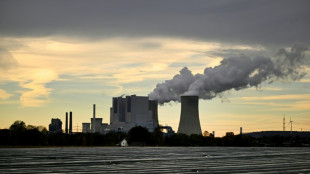
-
 Norway's Kristoffersen wins Schladming slalom
Norway's Kristoffersen wins Schladming slalom
-
Springsteen releases fiery ode to Minneapolis shooting victims

-
 Brady latest to blast Belichick Hall of Fame snub
Brady latest to blast Belichick Hall of Fame snub
-
Trump battles Minneapolis shooting fallout as agents put on leave

-
 SpaceX eyes IPO timed to planet alignment and Musk birthday: report
SpaceX eyes IPO timed to planet alignment and Musk birthday: report
-
White House, Slovakia deny report on Trump's mental state

-
 Iran vows to resist any US attack, insists ready for nuclear deal
Iran vows to resist any US attack, insists ready for nuclear deal
-
Colombia leader offers talks to end trade war with Ecuador

-
 Former Masters champ Reed returning to PGA Tour from LIV
Former Masters champ Reed returning to PGA Tour from LIV
-
US Fed holds interest rates steady, defying Trump pressure

-
 Norway's McGrath tops first leg of Schladming slalom
Norway's McGrath tops first leg of Schladming slalom
-
Iraq PM candidate Maliki denounces Trump's 'blatant' interference

-
 Neil Young gifts music to Greenland residents for stress relief
Neil Young gifts music to Greenland residents for stress relief
-
Rubio upbeat on Venezuela cooperation but wields stick

-
 'No. 1 fan': Rapper Minaj backs Trump
'No. 1 fan': Rapper Minaj backs Trump
-
Fear in Sicilian town as vast landslide risks widening

-
 'Forced disappearance' probe opened against Colombian cycling star Herrera
'Forced disappearance' probe opened against Colombian cycling star Herrera
-
Seifert, Santner give New Zealand consolation T20 win over India

-
 King Charles III warns world 'going backwards' in climate fight
King Charles III warns world 'going backwards' in climate fight
-
Minneapolis activists track Trump's immigration enforcers

-
 Court orders Dutch to protect Caribbean island from climate change
Court orders Dutch to protect Caribbean island from climate change
-
Sterling agrees Chelsea exit after troubled spell

-
 Rules-based trade with US is 'over': Canada central bank head
Rules-based trade with US is 'over': Canada central bank head
-
Lucas Paqueta signs for Flamengo in record South American deal

-
 Holocaust survivor urges German MPs to tackle resurgent antisemitism
Holocaust survivor urges German MPs to tackle resurgent antisemitism
-
'Extraordinary' trove of ancient species found in China quarry

-
 Villa's Tielemans ruled out for up to 10 weeks
Villa's Tielemans ruled out for up to 10 weeks
-
Google unveils AI tool probing mysteries of human genome

-
 UK proposes to let websites refuse Google AI search
UK proposes to let websites refuse Google AI search
-
'I wanted to die': survivors recount Mozambique flood terror

-
 Trump issues fierce warning to Minneapolis mayor over immigration
Trump issues fierce warning to Minneapolis mayor over immigration
-
Anglican church's first female leader confirmed at London service

-
 Germany cuts growth forecast as recovery slower than hoped
Germany cuts growth forecast as recovery slower than hoped
-
Amazon to cut 16,000 jobs worldwide

-
 One dead, five injured in clashes between Colombia football fans
One dead, five injured in clashes between Colombia football fans
-
Dollar halts descent, gold keeps climbing before Fed update

-
 US YouTuber IShowSpeed gains Ghanaian nationality at end of Africa tour
US YouTuber IShowSpeed gains Ghanaian nationality at end of Africa tour
-
Sweden plans to ban mobile phones in schools

-
 Turkey football club faces probe over braids clip backing Syrian Kurds
Turkey football club faces probe over braids clip backing Syrian Kurds
-
Deutsche Bank offices searched in money laundering probe

-
 US embassy angers Danish veterans by removing flags
US embassy angers Danish veterans by removing flags
-
Netherlands 'insufficiently' protects Caribbean island from climate change: court

-
 Fury confirms April comeback fight against Makhmudov
Fury confirms April comeback fight against Makhmudov
-
Susan Sarandon to be honoured at Spain's top film awards

-
 Trump says 'time running out' as Iran rejects talks amid 'threats'
Trump says 'time running out' as Iran rejects talks amid 'threats'
-
Spain eyes full service on train tragedy line in 10 days

-
 Greenland dispute 'strategic wake-up call for all of Europe,' says Macron
Greenland dispute 'strategic wake-up call for all of Europe,' says Macron
-
'Intimidation and coercion': Iran pressuring families of killed protesters

-
 Europe urged to 'step up' on defence as Trump upends ties
Europe urged to 'step up' on defence as Trump upends ties
-
Sinner hails 'inspiration' Djokovic ahead of Australian Open blockbuster


January smashes heat record, surprising scientists
Last month was the hottest January on record, blitzing the previous high and stunning climate scientists who expected cooler La Nina conditions to finally start quelling a long-running heat streak.
The Copernicus Climate Change Service said January was 1.75C hotter than pre-industrial times, extending a persistent run of historic highs over 2023 and 2024, as human-caused greenhouse gas emissions heat the planet.
Climate scientists had expected this exceptional spell to subside after a warming El Nino event peaked in January 2024 and conditions gradually shifted to a cooling La Nina phase.
But the heat has lingered at record or near-record levels ever since, sparking debate among scientists about what other factors could be driving warming to the top end of expectations.
Scientists warn that every fraction of a degree of warming increases the intensity and frequency of extreme weather events like heatwaves, heavy rainfall and droughts.
January was 0.09C hotter than the previous high of January 2024 -- a "sizeable margin" in global temperature terms, said Julien Nicolas, a climate scientist from Copernicus.
"This is what makes it a bit of a surprise... you're not seeing this cooling effect, or temporary brake at least, on the global temperature that we were expecting to see," he told AFP.
Stefan Rahmstorf, from the University of Potsdam, said it was the first time that temperatures recorded during a La Nina period were above those of a preceding El Nino.
"This is of serious concern -- over the past sixty years, all twenty five La Nina January's have been cooler than surrounding years," he said.
- Weak La Nina -
This year La Nina is expected to be weak and Copernicus said prevailing temperatures in parts of the equatorial Pacific Ocean suggested "a slowing or stalling of the move towards" the cooling phenomenon.
Nicolas said it could disappear completely by March.
Last month, Copernicus said that global temperatures averaged across 2023 and 2024 had exceeded 1.5 degrees Celsius for the first time.
This did not constitute a permanent breach of the long-term 1.5C warming target under the Paris climate accord -- but was a clear sign that the limit was being tested.
Overall, 2025 is not expected to follow 2023 and 2024 into the history books: scientists predict it will rank as the third hottest year yet.
Copernicus said it would be closely monitoring ocean temperatures throughout 2025 for hints about how the climate might behave.
Oceans are a vital climate regulator and carbon sink, and cooler waters can absorb greater amounts of heat from the atmosphere, helping to lower air temperatures.
They also store 90 percent of the excess heat trapped by humanity's release of greenhouse gases.
"This heat is bound to resurface periodically," said Nicolas.
"I think that's also one of the questions -- is this what has been happening over the past couple of years?"
Sea surface temperatures have been exceptionally warm over 2023 and 2024, and Copernicus said readings in January were the second highest on record.
"That is the thing that is a little puzzling -- why they remain so warm," Nicolas said.
- Open questions -
Bill McGuire, a climate scientist from University College London, said it was "astonishing and frankly terrifying" that January remained at record highs despite La Nina emerging.
Joel Hirschi, from the UK's National Oceanography Centre, cautioned against reading too much into a single month's data, saying record warmth had been observed following El Nino phases even after the onset of La Nina.
Scientists are unanimous that burning fossil fuels has largely driven long-term global warming, and that natural climate variability can also influence temperatures from one year to the next.
But natural warming cycles like El Nino could not alone explain what had taken place in the atmosphere and seas, and answers were being sought elsewhere.
One theory is that a global shift to cleaner shipping fuels in 2020 accelerated warming by reducing sulphur emissions that make clouds more mirror-like and reflective of sunlight.
In December, a peer-reviewed paper looked at whether a reduction in low-lying clouds had let more heat reach Earth's surface.
"These are avenues that must be taken seriously, and remain open," Robert Vautard, a leading scientist with the UN's climate expert panel IPCC, told AFP.
The EU monitor uses billions of measurements from satellites, ships, aircraft and weather stations to aid its climate calculations.
Its records go back to 1940, but other sources of climate data -- such as ice cores, tree rings and coral skeletons -- allow scientists to expand their conclusions using evidence from much further in the past.
Scientists say the current period is likely the warmest the Earth has been for the last 125,000 years.
J.Sauter--VB

